Our film analysis column is back: this time we deal with the esoteric aspects of the famous TV series created by Frank Darabont and inspired by the comic by Robert Kirkman.
di Maurilio di Stefano
(review by Marco Maculotti)
image source: edwardjmoran
Although it is now widely believed that the show has lost its beat and continues to roll faster and faster along that steep inclined plane that is the merciless judgment of the fans, it is impossible to deny THE WALKING DEAD, the television series that aired to start. since 2010 by the American network AMC as an original product, the merit if only for having breached the collective imagination and popular culture with its stories of zombie and extreme survival set in an unspecified post-apocalyptic future. But the series cannot be reduced to a mere triumph of splatter, armed clashes between groups of survivors and sociological-existential questions of varying scope. In fact, there is much more, for the eye capable of scrutinizing a little deeper (or at least we like to think so): correspondences and analogies which, if read on an esoteric level, point to rather pregnant symbologies of different mythologems. and ancient religions. We will try in this article to identify and analyze them one by one.
RICK GRIMES: SATURN / KRONOS IN EXILE AND THE GOLDEN AGE
In the pilot episode, aired not by chance the 31 October 2010 - ie the night of Halloween / Samhain [1] - Rick Grimes, the deputy sheriff who will be the protagonist for all seasons of the show to date, wakes up after about a month of coma in an abandoned hospital overrun with corpses. As weak and confused as he is, it doesn't take long for him to understand what happened: life, reality, the world as it knew them no longer exist and the earth is infested with myriads of zombie, living dead, walking dead - hence the title of the series obviously. This little introductory information is already enough to find evident analogies with at least two important thematic areas linked to mythology and esotericism: the exile of the god Saturn / Kronos on the island of Ogygia and the Wild Hunt.
According to the mythical tale, which came to us mainly through the words of Plutarch, the sovereign god of the golden age, Saturn / Kronos, dethroned by his son Jupiter / Zeus, was exiled to the extreme ends of the known earth, in a place located beyond the Pillars of Hercules, sulla so-called Island of the Blessed or, alternatively, on Ogygia. There, the famous god of the golden age lay so asleep, we could say precisely in a state of coma, in a cave together with some blessed souls: extraneous to the regular flow of time, the island was immersed in an eternal spring and was not exposed to the otherwise obvious influences and changes derived from the outside world [2].
The parallelism with Rick Grimes's situation is evident: asleep in a comatose state in a hospital room sealed off by no one knows who, the deputy sheriff manages to survive the assaults of the undead for a whole month. Incidentally, the figure of the character forced into a coma in some isolated place waiting for the awakening to occur at the end of a cosmic cycle [3] it is common to many cultures, and it would be impossible for us to talk about it extensively here: we just need to mention King Arthur and the god of Norse mythology Odin [4]. Also, as it will soon become clear from the first episodes, Rick Grimes is destined to become leader, guide, inspiration and not infrequently also judge of a small group of survivors with whom he will find himself sharing part of his 'new' life, a group that in the mind of the spectator will soon identify with the 'good' part of humanity that survived the virus that turns into walkers, in the walking dead.
It is therefore not difficult to complete the picture and make the figure of Rick coincide with that of Saturn who, awakened from the long coma during which humanity plunged into mortality and temporal linearity (Chronos), is ready to lead those who wish to follow him towards a new age of peace and prosperity, and thus to re-establish the cyclical nature of cosmic eras typical of ancient times and return to reign over a renewed Golden Age. Opening a small parenthesis, the parallelism with The Stand, one of the most famous and voluminous novels of Stephen King, published in 1978 and distributed in Italy with the title The shadow of the scorpion, in which a flu virus decimates the world population and the survivors are reorganized into two macro-factions that roughly represent good and evil.
After all, between TWD and Stephen King stands in the way as the only degree of separation Frank Darabont, creator of the series and director of the , formerly known for directing the film versions of two of the most touching and dearest stories to the public King has ever written, Le ali della libertà e The green mile - on the other hand both set in a prison, other typical place 'isolated' from the world and with its own rules that fans of the series know to be the refuge of Rick Grimes and 'his' for the entire duration of the third season and a good part of the fourth.
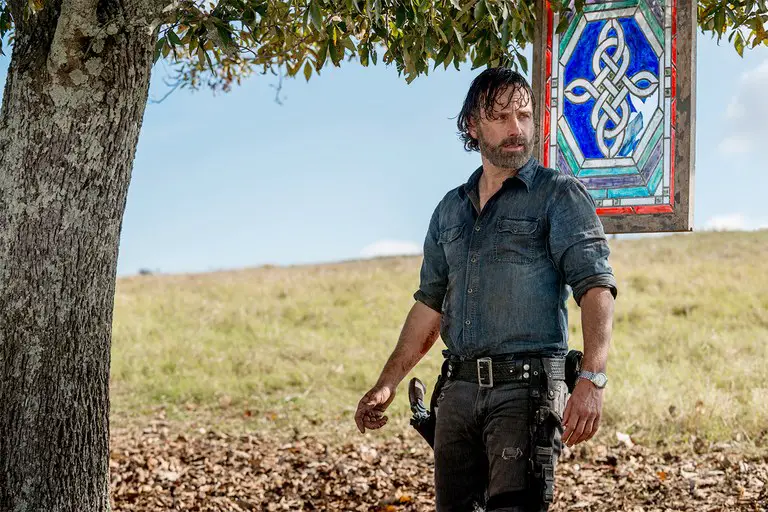
THE 'WANDERS' AND THE LEGEND OF THE WILD HUNT
Returning to the myth, the procession of walkers (rendered in Italian as 'wandering') refers instead to another characteristic theme of multiple cultures of Indo-European derivation: the Wild Hunt [5]. This legend, found in various guises in the Mediterranean, Germanic-Norse, British, and even Hindu traditions, wants that in the nights following the winter solstice the boundaries that separate the world of the living from that of the dead become more blurred. [6] and it may happen that a horde of undead, walking dead, or if we prefer zombie emaciated and desperate, he launched into savage raids on the earth, dispensing terror and omens of doom to anyone who comes across it. And it is precisely here then that we find our protagonist, Deputy Sheriff Rick Grimes, personification of the new Sun / Saturn, awakened / returned / reborn to lead humanity again to a golden age of peace, splendor and prosperity.
It seems almost superfluous to underline the analogy with Halloween, the celebration of ancient origins connected to Celtic celebration of Halloween which takes place on the night between October 31 and November 1 (the date, we recall, of the airing of the pilot episode of TWD), another typical recurrence in which the threshold between the world of the living and the world of the dead thins, the portal opens, and we return to talk of spirits, demons and undead.
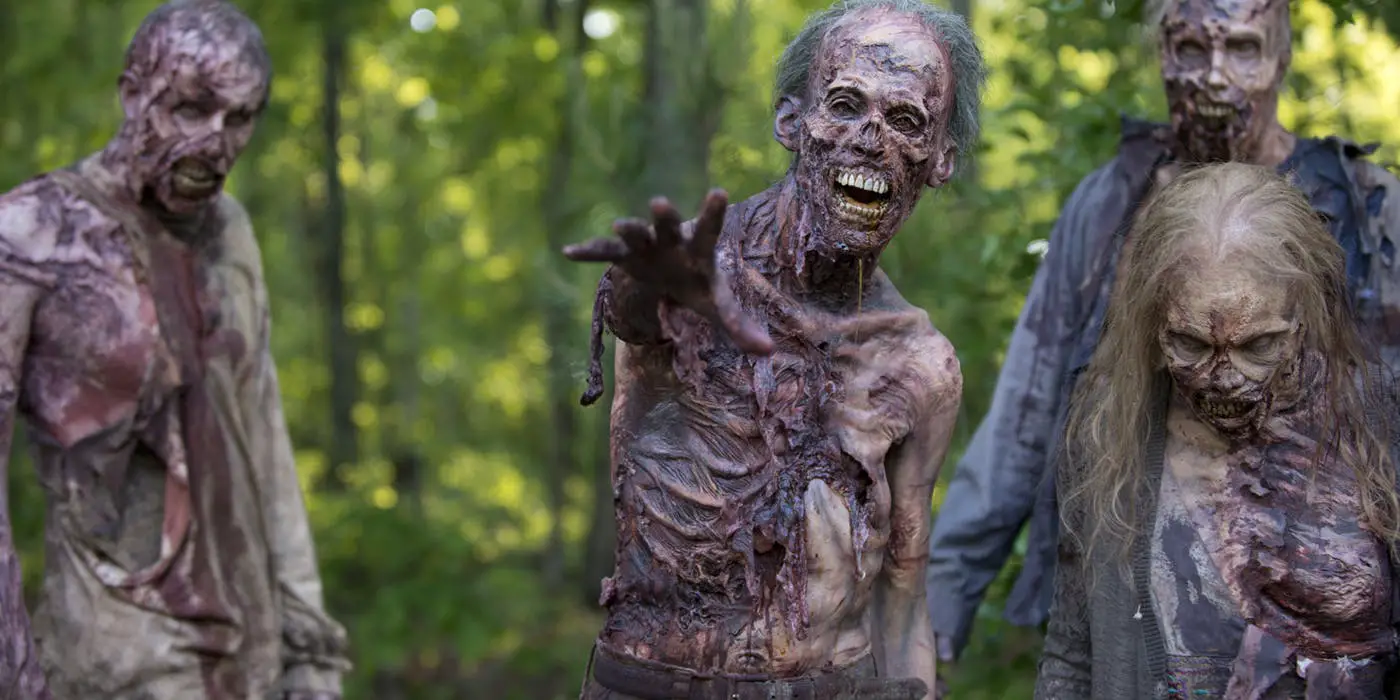
ATLANTA AND OGYGYA
Still, it can hardly be a coincidence that Rick Grimes' first destination just out of the hospital is the US city of Atlanta, capital of Georgia, which would have been used as a reception center and refuge for survivors of the epidemic that transforms zombie. The name Atlanta is in fact all too simple to connect to the Atlantic Ocean, which some believed to be home to theisland of Ogigia, Titan Atlas, which would have been forced by Zeus to carry the sky on his shoulders as a punishment for having allied himself with Saturn / Cronus, and to the mythical disappeared continent of Atlantis described in the Platonic dialogues, which would have been home to a generation of 'ultra-human' creatures during the timeless splendor of the Golden Age.
If we want to venture, it seems to us that not even the spatial choice of Southern United States be so random. The events involving Rick Grimes and his companions take place in a relentless sultry heat, and in a South of the country where the sun always shines, the heat is constantly humid and suffocating, and time seems to have stopped flowing. like the shadows that at noon thin out until they disappear. The scenario of a world imprisoned and crystallized at the zenith, therefore, which can be made to correspond as much to the peculiar immobility of mythical time as to the eternal present at the end of the year in which the world described in the show finds itself, that is, a place in turn located outside the space continuum- storm in which the horde of zombie undead never stops walking the earth and the return of the Golden Age, i.e. the renewed ascent of the sun over the vault of heaven, is postponed ad libitum. This eternal present after all, as we will underline at the end, is a dimension not entirely foreign to the universe of TV series in general.
THE WALKING DEAD E PRISON BREAK
Finally, to conclude this first section, we like to emphasize a group of analogies that TWD shares with prison Break, a TV series equally dear to the public and aired for the first time in 2005. Beyond the blatant element of the prigione, the escape from which (in a physical but also a symbolic-existential sense) is the main theme of all five seasons of PB, we like to highlight two other very unique aspects.
First, perhaps not all fans of PB I am aware that after the first four seasons, which ended with the full-blown death of the protagonist Michael Scofield, the show unexpectedly returned to life in 2017 with a fifth season after eight years of silence. Well, in the first episode of the fifth season it is learned that Scofield is far from dead: he was instead forced, in order to protect his wife and child, to work for a former CIA agent who bears the code name. from Poseidon (the well-known Hellenic god of the sea) and who relegated Scofield to a Yemen prison that bears the name - that's right - of ogygia.
Here the protagonist, under the fictitious identity of Kaniel Outis, was forced to play dead for years (to remain dormant, in a comatose state, we will now say) before escaping once again (read: wake up) and return to the world to defeat Poseidon, who in the meantime was able to seduce Scofield's wife and replace him in his life as her husband and father of her son. Incidentally, outis, in ancient Greek, means 'nobody', nothing but the name that Ulysses of the Odyssey adopts to deceive the Cyclops Polyphemus, Poseidon's own son; and still is Ulysses who, according to the Homeric account, finds himself stopping - not surprisingly for seven years - on the island of Ogygia, together with the nymph Calypso. In PB, just like Ulysses in the Odyssey, Scofield will eventually get rid of Poseidon and take back his family, his old life and his place in the world: the Golden Age - we could say - is finally re-established.
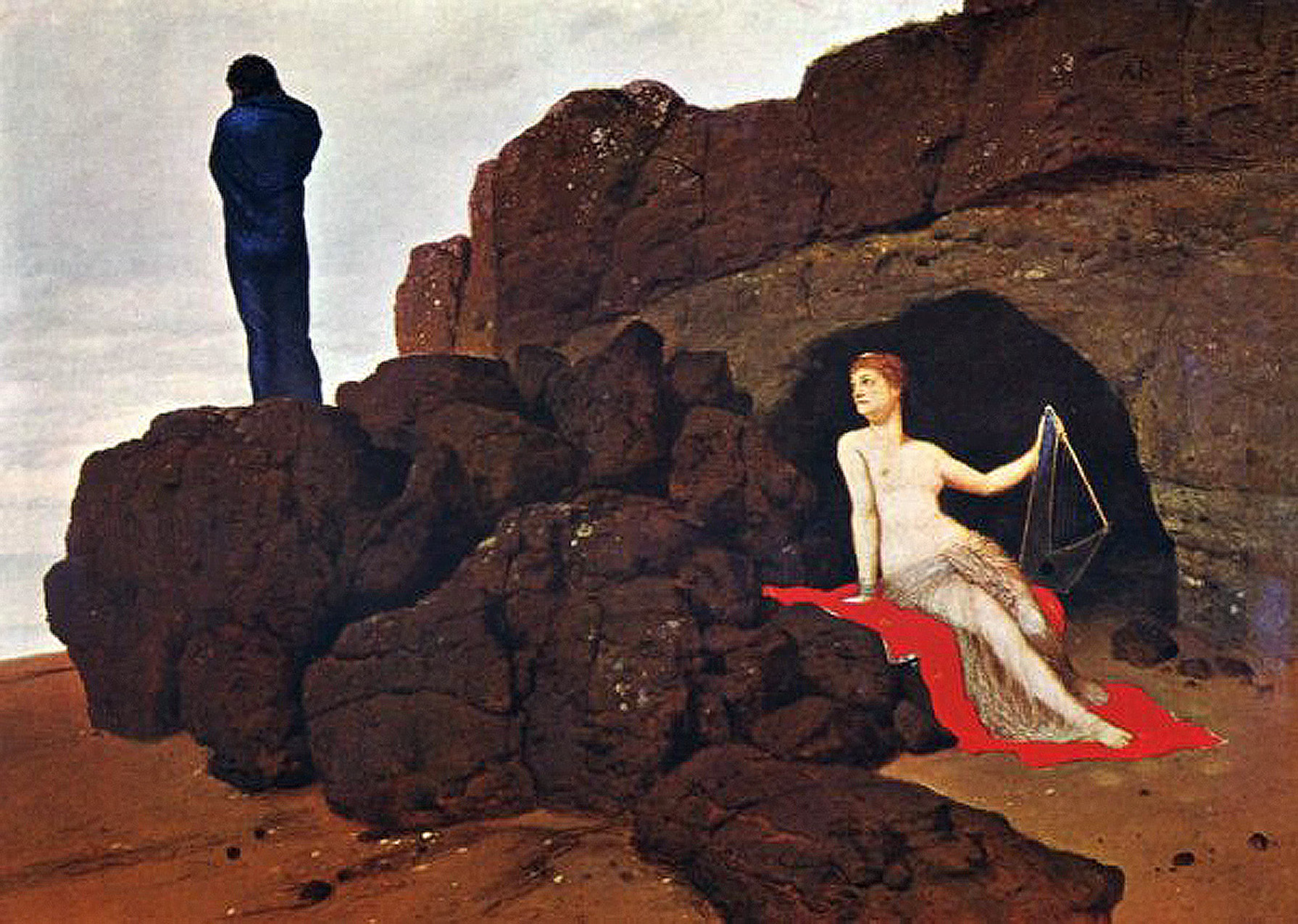
TERMS AND ALEXANDRIA
It is also curious to note the presence in TWD of the name Terminus: si deals with the place where Rick and his people arrive at the end of the fourth season, believing they will find an organized community of survivors, refreshment and protection after the terrible vicissitudes they have faced so far. But in reality the "sanctuary for all" is nothing more than a terrible place, where a group of brutal cannibals feed on other men for purposes that do not seem necessarily linked to survival in the strict sense.
Although it would be fascinating to deepen the figure / archetype of the cannibal, what we are interested in underlining here is precisely the meaning of the name. Terminus. In fact, it is not just about the original and unofficial name of the city of Atlanta (therefore a false version, in the negative, in a certain sense opposite to the enchanted Ogygia located in the Atlantic, or to the mythical Atlantis): Terminus (in Italian 'Termine') is also the name of the Roman god protector of rights, of terminal stones and above all of borders.
It is certainly not the first time that the word border, or limit, makes its appearance in these lines. Everything in the show - as well as in any human experience of existential value - is a discourse on how complex it is to establish boundaries / limits: right and wrong, lawful and not lawful, good and evil, life and death, human and non-human, etc. It is no coincidence that Terminus is used in TWD as a denomination for a place where the boundaries of humanity have been moved far beyond the usual standards, where precisely men feed on other men.
But just as meaningful, if not even more so, is the name of the next place Rick and his team arrive at and where they will settle this time for quite a long time: the safety zone called Alexandria. Still a free zone, a little paradise on earth, a locus amoenus isolated from the rest of the world and from the atrocities to which the invasion of zombie forced humanity, Alexandria clearly shares etymological origins with the city of Alexandria, Egypt, seat in antiquity of what remains without a doubt the most famous library in history.
The esoteric-initiatory meaning of a name that evokes the city seat of culture and ancient Wisdom is more than obvious, especially if we associate it with the other symbolic building of Alexandria in Egypt: the lighthouse. Listed as one of the Seven Wonders of the World, the Lighthouse of Alexandria was considered one of the most advanced and modern architectural works of the time; it is no coincidence that it remained up and running for over a millennium. Now, the symbolic implications of the Lighthouse are quite clear: light, illumination, guide.
A small detail that adds an extra touch of flavor to the whole picture, the leader of the Alexandria community is a woman with a great culture and a resolute character: Deanna Moore. Well, his name is practically the English transliteration of the name Diana, the Latin goddess of hunting who is originally, among other things: associated with light and day; believed to be the protector of women in childbirth, clear symbolism of (re) birth; symbolically associated with the laurel, known for the crown which the great and the wise are adorned with; symbolically associated with the deer [7] and in particular to the horns, another famous symbol of rebirth (the antlers of the deer fall and regenerate exactly every year); considered female guide of the Wild Hunt, horde of spirits and undead [8]; and finally, which will come in handy later in these lines, adored in the Gospel of the Witches as the goddess of the poor, the oppressed and especially the persecuted by the Catholic Church.
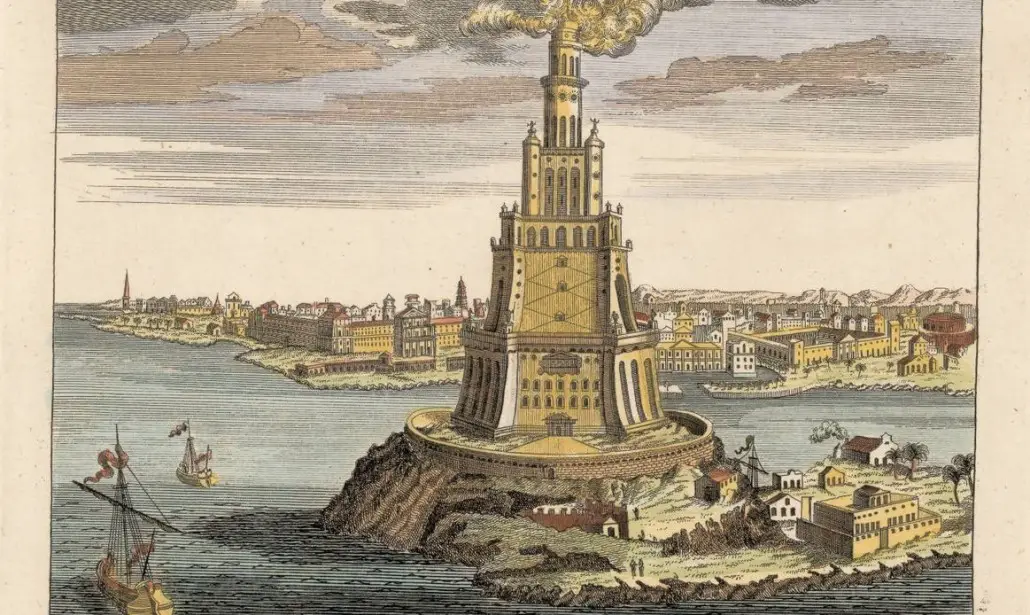
NEGAN: THE PERSONIFICATION OF THE CATHOLIC CHURCH AND THE USURPATING CHRISTIANITY
And now we come to Negan: Played by actor Jeffrey Dean Morgan, the character in question is one of the villain most loved TV series of recent years. It should be noted immediately that, apart from a couple of really cruel thoughts on the occasion of his first appearance on the show, he is more of a speaker than a man of action. This preliminary observation allows us to introduce the main thesis of this last section of our article: in our opinion, Negan is none other than the personification of the figure of Jesus Christ as his "dark double" and by extension of Christianity in all its most negative meanings.
How Jesus comes to bring a new kingdom, but his is one of dominion, terror and death rather than love, brotherhood and rebirth. As Jesus is associated with a crown of thorns, however he is not willing to wear it personally or to undergo any martyrdom or torture for others, let alone to give his life, indeed using it to dispense pain and to strengthen his own founded authority. about fear. Like Jesus, Negan brings a new order of things, but no one sends him, he 'works' only for himself: he has no father behind him, neither heavenly nor earthly, which is like saying symbolically that he has no past; his character touches four seasons of the series (counting the ninth that will soon air in Italy) yet we have practically no idea what his back story, while to tell the past of some characters, even quite secondary, the writers have often 'sacrificed' entire episodes-flashback.
We realize that the correspondences between the character of Negan - together with everything that surrounds him - and the Christian symbolism are perhaps not obvious, but certainly they are not even excessively hidden, and they are certainly enough to rule out the hypothesis of mere coincidence. Let's try to provide a schematic but detailed list below:
- Negan and his followers introduce themselves as 'the Saviors' (in the original version The Saviors), and since the Saviors' motto is “We are all Negan”, by extension Negan, their leader, is the Savior par excellence: Salvatore is an epithet historically always associated with Jesus of Nazareth;
- Negan and his followers are many, many, an almost unjustifiable number, or at least incomprehensible, unless you accept the climate of terror and threats with which he keeps his ranks at bay ('tricks' not too dissimilar to the Inquisition or from the well-known system of the sale of Indulgences, on closer inspection);
- the place where the Saviors live, under Negan's leadership, is called "The Sanctuary", just as Christian places used for worship or more typically for pilgrimages of the faithful are defined;
- Negan asks for offerings of food and resources and in principle does not kill anyone, but his is a mercy only on paper, which he shows only on condition that his dominion is accepted - which, in almost all cases, goes to incorporate pre-existing structures;
- Negan wields power and terror by brandishing a fully customized baseball bat, and we all know that the stick is the typical instrument symbol of the shepherd, the one who teaches the sheep, most of the time frightened, blind and by definition docile and foolish; the (Good) Shepherd, moreover, is another epithet classically used in reference to the figure of Christ;
- Negan's club almost has a personality of its own and even a name, Lucille, which clearly refers to the meanings of light, illumination and guide, in this case of a new god who dethrones the previous ones by implanting himself on their cults;
- Lucille is entirely covered with barbed wire, twisted around it in spirals and circles, and this cannot but make us think of the famous crown of thorns with which Jesus was crucified and by metonymy to the dimension of suffering and suffering that Christianity highlights as conditio sine qua non for purification and salvation;
- upon his appearance in the series, that is to say at the end of the sixth season, Negan uses Lucille to brutally kill two of Rick's companions that all the fans of the show were very fond of: it is Glenn Rhee, of which Maggie Green will become pregnant before and then widow, e Abraham Ford; it seems inevitable to dwell on this second name and underline its clear significance: the new prophet, Jesus, violently undermines the old one, Abraham, just as the New Gospel and the New Testament replace the Old;
- Negan's most ruthless and loyal right-hand man, perhaps one of the few truly dedicated without inhibitions to his cause, is called Simon; Well, it is not difficult to imagine that, should Negan die, Simon would take his place: we will certainly all remember from what is narrated in the Gospels that Simon is the name of Jesus' favorite apostle, so much so that the Savior will change his name to Peter and will make him his successor, that is the one that history identifies as the first Pope ("You are Peter and on this Rock I will build my church", Matthew 16,18:XNUMX).
Finally, if this were not enough, we want to reconnect to an argument which we have only briefly mentioned above: the now proven 'technique' used over and over again by the Catholic Church, throughout history, to appropriate or overlap existing religious and cultic structures by engulfing the salient aspects and the most distinctive traits in order to be more easily accepted by the masses [9]. Among the expedients used, just to name a few of the less sophisticated: the transformation of pagan places of worship into churches, the superimposition of the figures of the Saints to deities / traditional indigenous figures of the regions to be evangelized, the dethronement of pagan divinities with the adjoining introduction of saints Christians with the same characteristics, etc.
The picture is now completely clear and, moreover, not too dissimilar from what history shows us: this terrible Antichrist appears as if out of nowhere, gathers with seemingly inexplicable haste and efficiency an endless army of followers ready to give their lives for him thanks to a mixed cocktail of threats on Purgatory and Hell and promises of 'salvation', asks for sacrifices and offerings, and above all it appropriates all pre-existing structures associated with culture and / or light (such as the city of Alexandria, which in its historical version of Alexandria of Egypt was precisely the last bastion symbol of Hellenistic and 'pagan' culture that Christianity needed to bury in order to establish itself), thus plunging humanity into an era of darkness and terror and thus averting the return of the Golden Age.
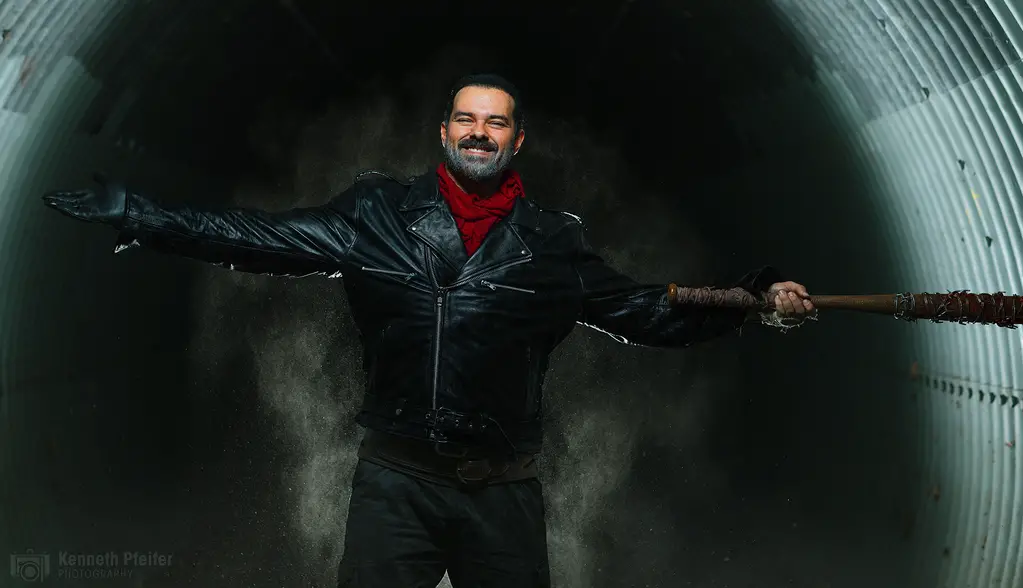
PROJECTED IMPACT
Certain that we have overlooked and forgotten a lot, we would like to continue to analyze many other minor but no less significant aspects present in TWD, Such as the Kingdom, the character of King Ezekiel, his tiger with the absolutely random name of Shiva, the 'rule' that the only way to kill one zombie or hit it in the center of the head, right at the seat of the 'third eye', and many other figures /topos which certainly on closer examination refer to very specific and equally fascinating myths, traditions and legends than those mentioned so far. However, now we will content ourselves with drawing the threads of the discussion and concluding with the thesis we intended to demonstrate.
The TV series themselves are timeless islands, just like Ogygia. Their protagonists are rarely born, often correspond to specific archetypes, and even if they sometimes die they remain alive in the mind of those who have followed their story with fidelity and he is fond of them: in this sense we feel we can say without fear of making a mistake that they may not be gods for us, but certainly demigods or at least 'heroes' (in the Hellenic sense of the term) and the modern telefilm is none other than one of the contemporary forms that the myth has taken to satisfy its need to perpetuate itself and its archetypal teachings [10].
In particular, some shows suggest as a basic message that not even death itself is something truly definitive. In fact, the death of a character, however mourned and cleared up, and his more or less articulated journey in the Underworld or in some other dimension, no longer correspond to a certain and final departure: just think of the analyzed here. prison Break e TWD, the particular zombies and what happens to Jon Snow in Game of Thrones [11], to the countless expeditions to Heaven, Hell and Purgatory of the Winchester brothers in Supernatural, and even, wanting to smile, to the historic female series Desperate Housewives, in which the protagonist who loses her life in the pilot episode will 'survive' for eight whole seasons, becoming the off-screen narrator of all the events involving her friends and neighbors.
However, it must be emphasized that the post-apocalyptic scenarios that man tells are always places / times in which there is still humanity. Decimated, perhaps, but still alive and still humanity. In this sense the Apocalypse reveals itself once again to be what esoterically has always been, that is, not the end of everything but the end of un everything as we know it, which makes a slight but huge difference. In short, Rick Grimes's journey is far from over. Will Negan ultimately win, one way or another? If Negan is defeated, will another 'god', even more ruthless and powerful, come to try to establish his dominion? And above all, since Maggie Rhee is still pregnant with her late husband Glenn, we will let you go with an ambiguous allusion that only insiders and true enthusiasts will be able to grasp: who will save the widow's son?
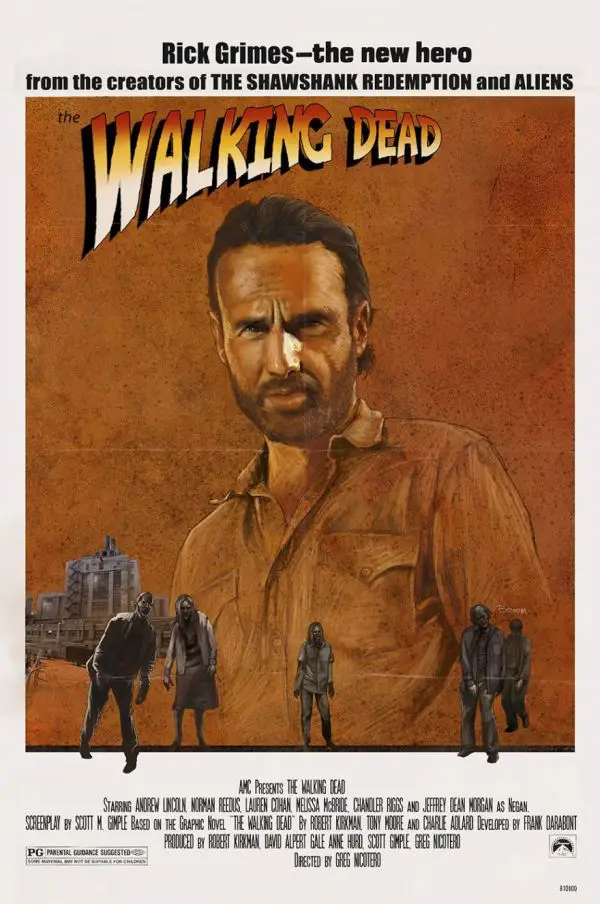
Note:
[1] See A. Massaiu, Stories from past worlds: from Samhain to Halloween, on AXIS mundi.
[2] On Saturn / Kronos in a coma, cf. M. Maculotti, Apollo / Kronos in exile: Ogygia, the Dragon, the "fall" and A. Casella, Saturn, the Black Sun of the early days, on AXIS mundi.
[3] On the myth of the concealment of the ancient king, cf. D. Perra, The myth of concealment in Eurasian traditions, on AXIS mundi.
[4] On King Arthur and Odin as "rex quondam, rexque future”And as conductors of the Wild Hunt, cf. G. Failli, Hellequin's Masnada: from Wotan to King Arthur, from Herla to Harlequin, on AXIS mundi.
[5] On the Wild Hunt and the army of the dead, cf. G. Failli, The Marvelous in the Middle Ages: the "mirabilia" and the apparitions of the "exercitus mortuorum" and GM Mollar, The "Ghost Riders", the "Chasse-Galerie" and the myth of the Wild Hunt, on AXIS mundi.
[6] On the "solstitial crisis" and the aforementioned "opening of the borders that separate the world of the living from that of the dead" during the winter season, cf. M. Maculotti, Cernunno, Odin, Dionysus and other deities of the 'Winter Sun' e The archaic substratum of the end of year celebrations: the traditional significance of the 12 days between Christmas and the Epiphany, on AXIS mundi.
[7] On the symbolism of the deer as the bearer of the re-birth of the Year, cf. M. Palmesano, The magic of the Mainarde: on the trail of the Janare and the Deer Man, on AXIS mundi.
[8] On Diana as host of the Wild Hunt, cf. M. Maculotti, The Friulian benandanti and the ancient European fertility cults, on AXIS mundi.
[9] On the nefarious action of the Church towards the ancient pagan cults, cf. M. Maculotti, From Pan to the Devil: the 'demonization' and the removal of ancient European cults, on AXIS mundi.
[10] On a certain type of initiatory-esoteric symbolism in TV series (and cinema), cf. M. Maculotti, The secrets of Twin Peaks: the "Evil that comes from the woods" e Paolo Riberi: the “Gnostic Renaissance” in modern cinema, on AXIS mundi.
[11] On esoteric symbolism in GoT, cf. R. Cecchetti, “Game of Thrones”: Bran, the crow, the weaving, on AXIS mundi.

Fantastic analysis. That's right: cinema and television (but only if well done, of course) are the places where the Myths of our time are created and disseminated. Thank you.
Thanks to you for your interest!
Well written article, however, in my opinion there are forcing.
Terminus indicates the end of the tracks, in the States they use it to indicate the terminus; Considering that the protagonists came from a relatively static season (the third), set in a prison where they had mistakenly thought of regaining their freedom behind barbed wire fences and that, on the contrary, the whole fourth season develops on a journey, following the tracks, leaving traces that is going towards a freedom closer to feeling, I tend towards a less esoteric and more simplistic meaning. Above all, given that the fourth season ends with Rick and his companions locked up in a freight car in the terminal, I would lean towards a meaning of dehumanization that approaches the food car with the Jews' wagons (here is the choice of location), but not of Terminus in the sense of the ultimate border (to be overcome).
Deanna / Diana. Even here we are too far beyond my opinion. In Alexandria the light and the lighthouse are not represented by Deanna, but by her husband who is a former professor of architecture (unfortunately in the series this is reduced to a hint). Deanna and her fall are consequences of the management of the woman, a former congressman and (perhaps) a former psychologist or psychotherapist. Deanna represents yet another failure in applying the old methods to post apocalyptic reorganization and probably the futility of even the old psychoanalytic methods (of investigation) after a trauma or a series of traumas so upsetting that there is no method to deal with them if do not let them heal and accept what follows. If indeed Deanna had been chosen as the evocative name, her husband probably would not have been characterized that way. And Deanna wasn't going to end up like she does.
Regarding the Negan / Jesus association I do not express myself, it seems to me almost clickbait. However: Lucille was the name of Negan's first wife and in TWD it is a symbol of violent command as well as a phallic call, I do not exclude that the shepherd's staff, well before the advent of Christianity and Judaism already represented all this. I don't understand. The only thing Negan doesn't represent is a messiah or an anti messiah.
It seems to me that Atlanta is really the home of the CDC so being the end of the first season ..
It seems to me that it is set in the central eastern United States, in the belt that rises from Atlanta, the south of the United States would have probably been too arid .. the north too populous or too cold. The alternative was the west coast but it would undoubtedly have less charm than Georgia, Carolina and Kentucky.